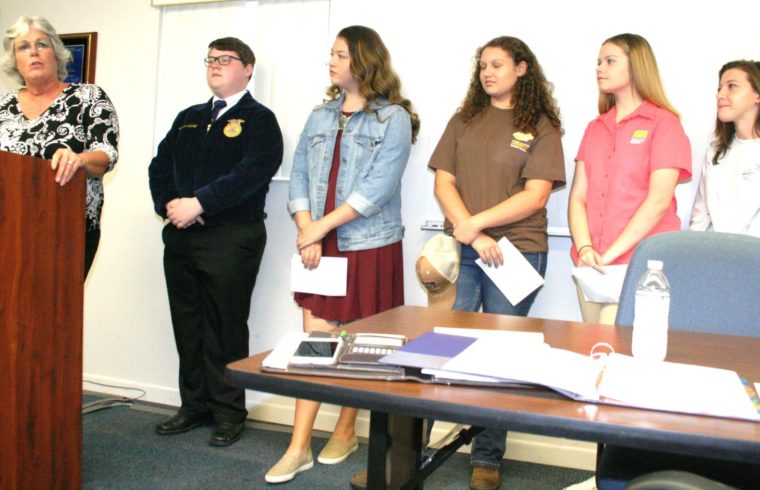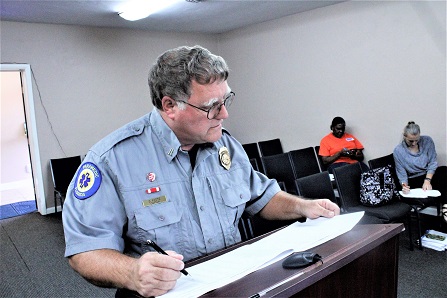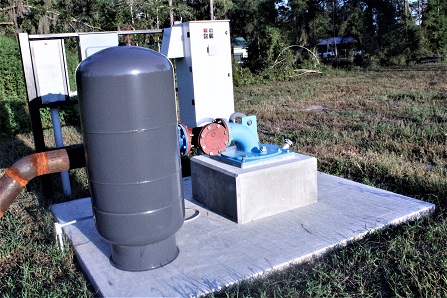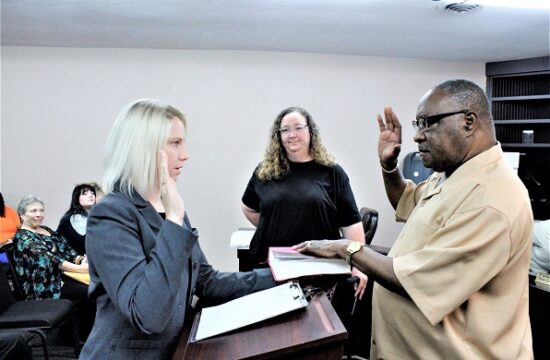By Terry Witt – Spotlight Senior Reporter
A group of Bronson Middle High School students gave an eye-opening report Tuesday to the Levy County School Board outlining the positive and negative impacts of more restrictive state water quality regulations set to take effect on July 1.
The Florida Department of Environmental Protection (DEP) is implementing tougher Basin Management Action Plans (BMAPS) in an effort to reduce nitrate pollution being released into the Floridan Aquifer, the state’s primary drinking water supply.
Part of the BMAPS program is aimed at protecting springs and rivers from being contaminated by nitrates from home septic tanks, farm fertilizers and wastewater discharges, golf course fertilizers and other human activities that generate nitrate pollution.
Student Jackson Asbell said stakeholders expected to be impacted by these new regulations include homeowners, agriculturists, Florida recreational areas like golf courses, the Florida Department of Health, DEP and the Suwannee River Water Management District.
Marcia Smith, agriculture instructor and FFA advisor at BMHS, introduced Asbell, Sidney Bray, Maggie Huber, Bailey Herring and Emilee Munden, the students giving the presentation. Those students along with Ethan Church are practicing for the Florida FFA Convention. The students will make the same presentation at the convention as part of a statewide competition.
Students played the roles of stakeholders. Church represented DEP but Smith took his place because he couldn’t get off work. Sidney Bray represented Florida Farm Bureau; Maggie Huber played the role of a Levy County farmer; Bailey Herring represented the Florida Department of Health and Emilee Munden was a homeowner and environmentalist.
Smith learned about the revised BMAPS while talking to her brother Wesley Asbell, an employee of the Levy County Department of Health, the state agency that regulates septic tanks. She expressed concern that many stakeholder groups, such as homeowners and farmers know little about what’s coming down the pike on July 1.
BMAPS will establish regulations known as Maximum Daily Loads to control how much nitrogen is released into the Upper Floridan Aquifer. Limits will be placed on the amount of wastewater that can be discharged. Best Management Practices will be required for agricultural operations.
“It’s designed to implement pollution reductions by establishing those total Maximum Daily Loads,” she said. “They are broad-based plans – a lot of stakeholders involved.”
DEP will rely on input from school boards, county commissioners, and homeowners that have a septic system as they implement the new and more restrictive regulations.
“The stickler point is it goes into effect on July 1, 2018. That is less than three months away and they (BMAPS) are enforceable by secretarial order through the Department of Environmental Regulation,” Smith said. “The DEP has revised more than a dozen BMAPS for our area including all of our outstanding Florida springs, including the Ichetucknee, Hart Springs in Gilchrist County and Silver River and Rainbow River. BMAPS total almost 14 million watershed acres in Florida and directly affect 6.5 million Floridians. And you are probably one of them.”
“Nitrogen sources to the Floridan Aquifer is the problem,” she said.
Wastewater treatment facilities, home septic tanks, livestock operations, farm fertilizers (used to grow thousands of acres of watermelons and peanuts in the tri-county area) and urban fertilizers spread on homeowner yards are sources of nitrate pollution.
“Part of the nitrogen is taken up by plants, but that which doesn’t end up in the Floridan Aquifer and that’s the problem,” she said.
Sidney Bray, playing the role of an official from Florida Farm Bureau, which has 145,000 members in Florida, said the organization has teamed up with local agriculturists to work through the implementation of BMAPS. She said her role is to make sure farmers and ranchers know the pros and cons of BMAPS.
“After visiting many counties I know many of these regulations are going to catch many homeowners and ranchers by surprise,” she said. “The average input of nitrogen nitrate and phosphorous in most places will have to be reduced by 82 percent. That’s an almost un-accomplishable amount.”
Failure to follow BMAPS will result in a notice of violation, she said. After a set amount of time, the violator will be fined on a daily basis. She said it will be difficult to monitor and implement the “many variables that must be taken into consideration.”
Maggie Huber, playing the role of a local farmer, said farmers are dependent on resources of the land and they consider themselves stewards of Florida and its resources. As a farmer, she and other farmers already implement Best Management Practices to prevent soil erosion and prevent leaching of chemicals into groundwater.
While the new regulations have built-in cost-sharing measures to assist farmers, Huber said she expects the regulations to place an unreasonable burden on farmers.
“How many more of these government regulations will I have to put up with,” she said. “My colleagues in the dairy industry will really be hit hard when these go into effect in just three months.”
Huber said she has already signed a notice of intent to participate in a Best Management Practices program offered through the Florida Department of Agriculture and Consumer Services.
“Implementing Best Management Practices on the farm are in the best interest of the environment but can cost extra,” she said.
Bailey Herring, role-playing as an official from the Florida Department of Health, said the issue is that there are high levels of nitrogen and phosphorous “in our waters” that can lead to a multitude of health problems, including rashes, stomach and liver problems, respiratory problems and neurological problems.
However, she is concerned about whether the average homeowner can afford the cost of these advanced septic systems. And she noted that while the Department of Health inspects septic tanks, DEP is in charge of implementing the rules governing septic systems.
Emilee Munden, playing the role of a homeowner and an environmentalist, reminded her audience that the springs along the Suwannee River are part of the greatest concentration of springs in the world.
“We all must do our part to save these precious natural resources so that generations to come will be able to enjoy them as much as we do,” Munden said. “I am so glad the State of Florida is finally going to hold those responsible for the pollution of our water accountable.”
———————
Photo by Terry Witt: Bronson Agriculture instructor and FFA advisor Marcia Smith introduces students Jackson Asbell, Sidney Bray, Maggie Huber, Bailey Herring and Emilee Munden. They gave a presentation to the Levy County School Board on the new Florida Basin Management Action Plans (BMAPS).
Bronson FFL Role Playing Presentation on BMAPS Regular Meeting of School Board of Levy County April 10, 2018
Posted April 13, 2013
Link to DEP website for more information on BMAPS: https://floridadep.gov/…/basin-management-action-plans-bmaps













